
By Emilio Sanchez Vicario, CEO of the Emilio Sanchez Academy and the ES Academy Marketing Team
Rafa Nadal and his greatness
Once again I find myself sitting at my computer, writing about Rafa. The thought that this is the last time I do it as a player saddens me deeply. Rafa has accompanied me these last 25 years in my post-player stage and I have been able to tell everything about him on television, in newspaper articles or in technical analysis. I think I have written so much about Rafa that I have analyzed him more than myself, I have compared him to the Little Prince, to the Greek gods, to extraterrestrials, I have explained his technique, his tactics, I have praised his physique and not to mention his head, trying to give a personal version to feel different. In studying his trajectory what I have tried is to talk about his legacy, and today I will try to explain what has led him to his GREATNESS.
Let’s choose the value, pillar, or concept close to GREATNESS that we want, all of them bring us closer to Rafa. So let’s tell his story to understand how he has reached the end of his road leaving so much behind.
Today the big media offer to the youth the example of fictional superheroes with inhuman superpowers, such as Captain America, Spiderman, Superman, Wonder Woman…. Rafa is our protagonist and he has written a story with human superpowers that has taken him to the Olympus of those who touch greatness, but with real powers.
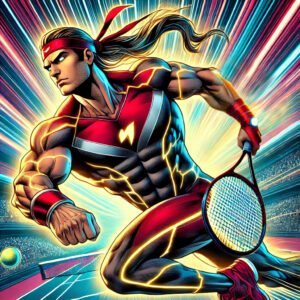
Our superhero decided to show himself to the world through tennis, he marked an era and has left a legacy that neither the most experts nor I myself had achieved, and that is why so many times we call him alien, inhuman, monstrous, as he was breaking barriers and yet no one could imagine that he would get so far. If we analyze in depth his virtues and how he has been able to achieve it, we find values with a background to do good, always with humility and dedication encompassing all the basic pillars that we parents want our children to have.
Let’s go to the beginnings. Rafa wanted to be a footballer like his uncle Miguel Angel Nadal, but his other tennis uncle took him to play tennis, and made him soak and feel that passion for our sport. It was here where the superhero began to forge. His uncle Toni trained him in tennis, but what he mainly focused on was to create a warrior who could grow when adversity was the greatest. He managed to work the mind so that emotions would not turn into frustration, to achieve simplicity in tactical patterns and so that his physique and mind would become privileged, repeating and repeating until he created habits of behavior. If we add to that his dream of achieving that performance in competition, valuing every ball received, all these factors helped him to break every barrier that was put in front of him, becoming that superhero invincible on clay, the best on hard courts and inspiring on grass, where his game did not adapt but his illusion and his desire to break the mold helped him to achieve it by beating the best of all.
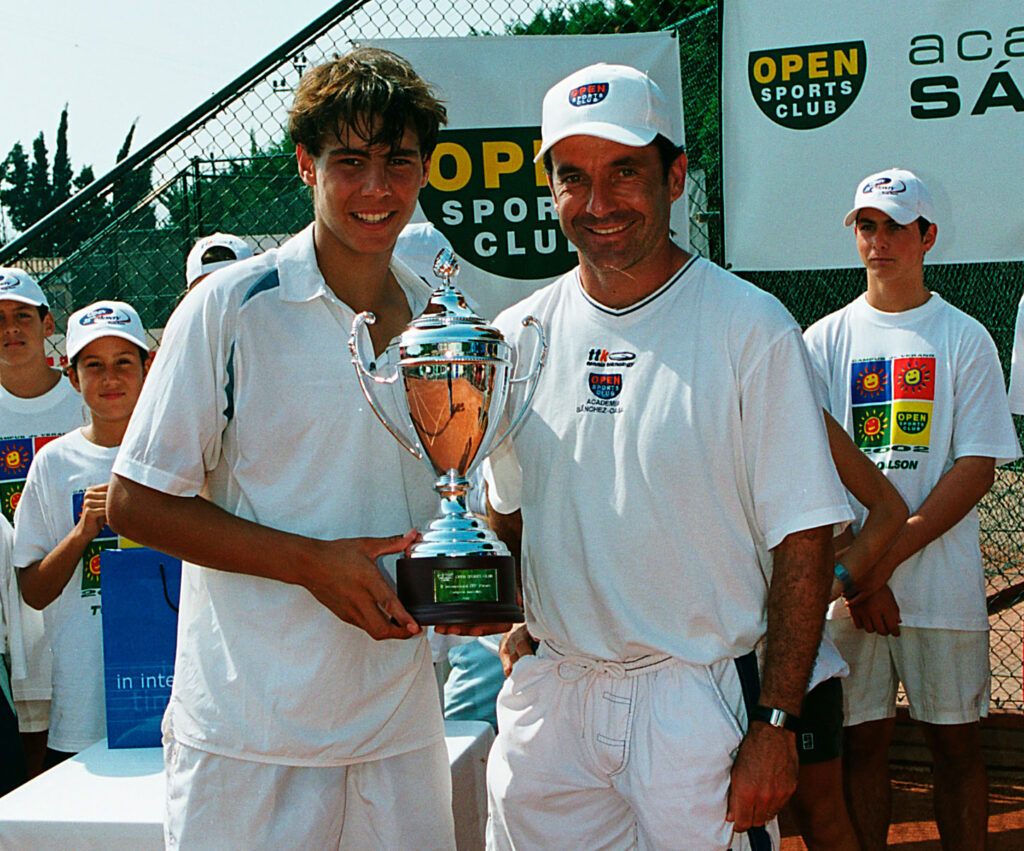 He chose at the age of 11 to play left-handed being right-handed, since he hit everything with two hands and did not think that when he grew up he would lack speed in his serve. This fact limited him a lot, he served 20 km/h slower than the others and above all he lacked precision in the direction and angles. He worked tirelessly on this aspect during the 20 years of his career, but even if he did not win so many free points, he made up for it with continuity and with his second and third shots. This ability allowed him to win almost 90% of his serves, the same figure as his rivals but with few direct points.
He chose at the age of 11 to play left-handed being right-handed, since he hit everything with two hands and did not think that when he grew up he would lack speed in his serve. This fact limited him a lot, he served 20 km/h slower than the others and above all he lacked precision in the direction and angles. He worked tirelessly on this aspect during the 20 years of his career, but even if he did not win so many free points, he made up for it with continuity and with his second and third shots. This ability allowed him to win almost 90% of his serves, the same figure as his rivals but with few direct points.
At the age of 15 he discovered the terrible birth disease in his left foot, the Müller-Weiss syndrome, with very few treatment options and with the cross of knowing that any day he could play his last game. He was fitted with special insoles, with adapted shoes that he never changed, only the color, throughout his career.
If he had already worked on resilience with his uncle, suffering from this pathology made him value even more what he loved. That change in the way he walked because of the insoles is perhaps the cause of some of his many knee, hip, psoas or abdominal injuries. Seeing all that he must have gone through is moving and knowing that that superhero costume has helped him to be able to overcome it touches anyone.
I had heard of him, but the first time I saw him was at our tennis academy playing the final of his first Future. He was with Toni Colom, Toni Nadal’s squire and his father. There I met him and I was struck by his personality on the court and that of his father off it, I thought “How similar they are”. Watching him play I saw a gifted player, but I did not see the superhero. It was impressive to see him win at just 15 years old, with total dominance of the midfield. Then he extended his victories to 7 or 8 in a row. Then he knew he was ready to make the leap.
He went to Monte Carlo and revolutionized it. With Carlos Costa as his manager, his intuition and the choice of a former player manager gave him an advantage. Carlos always looked after his schedule and recovery before the business.
After the Monte Carlo tournament and the difficulties he faced there, he joined his team with Angel Ruiz-Cotorro, a doctor who, like Carlos, had also been a tennis player and who became a key player throughout his career. He helped him to recover better, to dose himself and above all to face adversity by taking the heat out of the matter and working hand in hand with Rafael Maymó, the faithful physio who also became an essential member of the staff.
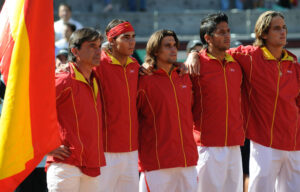
Later when I took the reins of the Spanish Davis Cup team, I got to know him better. I understood the other Rafa when I met his mother, who was the piece that completed the puzzle. His mother brought humility, closeness, gentleness, she was the polar opposite of his father’s personality, and the resulting combination is Rafa.
Those years on the court, sharing battles, preparation, desperation, and analyzing off the table his rages, his reactions, always trying not to lose confidence and reinforcing the beast, I learned how his mind worked, and especially watching him I realized that he is like a sponge, as he absorbed the best of everyone to strengthen and compete, especially those closest to him as his parents, his physio Maymó, his doctor Ruiz-Cotorro, his manager Costa or his uncle Toni. Rafa is the sum of all of them. In any match he has always nourished himself from his groups and to see how he looked at his bench is worthy of praise because he absorbed everything they had inside and more.
I remember as if it were yesterday my first conversation with him while coaching the Davis Cup team, I told him, “Look, I will not shut up, I will try to help you and try to convince you of what I see”, and he replied “Emilio, when I play I am nervous, angry, fearful, sometimes happy or happy and many times I do not know what to do, so, if I trust you, rest assured that I will do what you tell me”. I looked at him thinking “What a head, we are going to have a good time”.
Rafa has been the example of how to train with maximum intensity, there is not a shot to which he does not put maximum focus, his concentration and effort is such that very rarely you will see him not choosing his repertoire well. He starts at 100% on every shot, on every point, in every game, in every set, in the whole match. Training with him is an experience as if it were a final, he always trains with the goal of improving, to reach his best version and as he repeats and repeats, then in the matches it comes naturally to him.
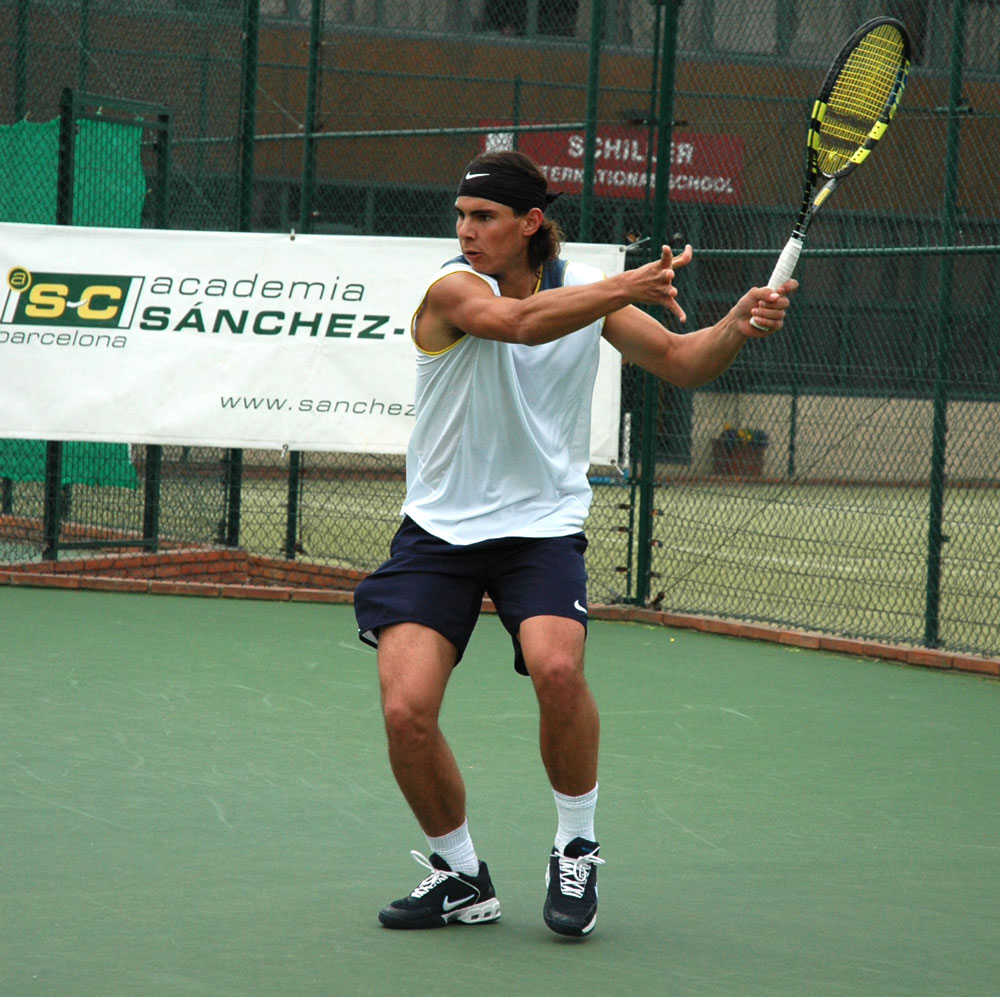
Another part of his magic are the routines before the matches, he knew what worked best for him, not only on the court with his bottles and rituals before each serve or rest, but also in training and in the preparation of the match. Off court he repeated locker, hotel, restaurant, times, breaks. In his first Roland Garros, he was playing Roger in the semis, I was in Paris as a TV commentator and playing the Senior Legends. That Friday with almost nobody in the locker room after my match I went to take a shower and I saw him standing in front of a shower, with more than 20 free and I asked him, “What are you doing there?” He pointed to a shower and gestured to me, I looked and in it was Roger in his shower. Either he was showering in the other’s, or he was waiting, but he wasn’t going to change, I’m sure in these 20 years he never changed showers at Roland Garros. Then he beat him in 4 sets and conquered his first win out of 14 at the RG. And that Roger was another superhero who had to reinvent himself to be able to fight against Rafa.
Rafa and his story is one to tell. He managed to highlight his mental strength to be able to compete against a player with better technique, more subtle, with ease and he with his game and his limitations but with a determination, belief, confidence and concentration almost inhuman, managed to overcome him on most occasions.
But as it happens in life another guest to the battle appeared, Novak Djokovic. In the beginning Rafa and his mind broke him in adversity, but the Serb was filing his shortcomings and weaknesses and becoming very dangerous and finally finding the hole where to hurt Rafa. He began to attack his forehand, something that no one had dared before and it worked to perfection, so much so that Federer, Murray and Wawrinka began to do the same. Besides, both Rafa and Roger had shown their greatness in victory, but also in defeat. Novak didn’t play at that, he was the wolf of the situation who would roll over and pounce even when it wasn’t his turn.
Rafa knew that to stay on top and beat them again he had to reinvent himself and during one of his most serious injuries in 2016, he decided to make the most difficult change, replacing his mentor, his uncle, with Carlos Moya and taking the commitment to give a 180-degree turn to his forehand and attacking game. He had to become more aggressive, to win the court so that they could not attack his forehand. That transition after having been the best with some patterns, having to change them, is only worthy of the gifted. His perseverance, dedication and good management gave him results, managing to defeat both again and win 8 Grand Slams with better serve, attack, forehand, backhand, slice, volley and drop shots. One of his greatest virtues has been to let himself be coached, to believe that his people, that his team would always help him in that goal. For me he is the player who has listened the best and most attentive to any advice to make it part of his repertoire with a single goal, to be better.
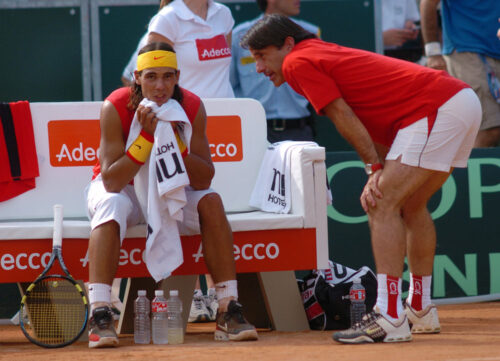
When I analyze a player and we talk about exceptional talent, I first look at how much time the player has between the bounce of the ball and the stroke. His coach Moyà with his forehand could almost have a coffee before hitting the ball, while, on the other hand, with his backhand he lacked time. Rafa is a ten in creating the necessary time to give the right direction to both the drive and the backhand. The next key point is the execution or stroke and the sense you have when hitting it, you can make the same stroke changing speeds, angles, heights, is to feel the ball, handle it and Rafa is another ten, millimetric precision. His uncle always used to say that he had no hand, but for me his hand was privileged because he could easily get the shots to the heights and directions he wanted. And finally in that execution the confidence that whatever you decide to do with that shot, high, low, strong, slow, spin, slice goes where you want it to go results in another honorable mention in confidence.
His greatness is difficult to summarize, it is like an exceptional state of performance and superiority in every moment of the battle, finding a way to be better than others in the key moments of the matches. Rafa has it all: focus (analyze, live, give, receive, set achievable goals, improve), passion (intensity, want, love, enjoy) and state of mind (resilience, dedication, self-belief, confidence, strengths, habits, values).
However, I am a fan of Rafa because of his greatness since I have always been impressed by great players like Jordan or Severiano himself, who defined greatness with his 4 C’s: Condition, Head, Heart and Courage (Cojones he used to say, although today it is not right to say it, but that is how he expressed it). That is Rafa, our Rafa and although from now on he will not play anymore, there will remain his legacy, his way, his philosophy and his superpowers, which can be taught. He has before him a new challenge in his life, he will surely find ways to continue making a difference.
Thank you Rafa for allowing me to learn so much, without wanting to inspire those around you to be like you, follow that path. Today is not a goodbye, because seeing you these days cheering at the Davis, I know that you will continue to be close and that you will be able to bring that Greatness in so many other things you do.















